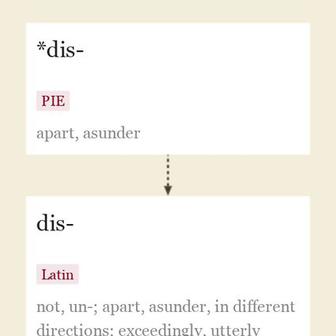distention (n.)
也是 distension,"膨胀的行为; 膨胀的状态",15世纪早期, distensioun,源自拉丁语 distensionem/distentionem(主格 distensio/distentio),动作名词,源自过去分词词干 distendere,意为"膨胀或伸展,延伸",源自 dis- "分开"(参见 dis-)+ tendere "伸展",源自 PIE 词根 *ten- "伸展"。
distention 的相关词汇

拉丁语词缀,意为1. “缺乏,不”(如 dishonest); 2. “相反,做相反的事”(如 disallow); 3. “分开,离开”(如 discard),源自古法语 des- 或直接源自拉丁语 dis-,意为“分开,分离,朝不同方向,比喻为‘不,非’,也表示‘极其,完全’。在大多数有声辅音前,它被同化为 dif-,在 -f- 前被同化为 di-。
拉丁语前缀来自原始印欧语言的 *dis-,意为“分开,分离”(源自古英语 te-,古撒克逊语 ti-,古高地德语 ze-,德语 zer-)。原始印欧语言的根词是 *dwis- 的次生形式,因此与拉丁语 bis “两次”(最初为 *dvis)和 duo 有关,表示“两种方式,分开”(因此表示“分开,分离”)。
在古典拉丁语中, dis- 与 de- 相似,意思也差不多,但在后期拉丁语中, dis- 成为首选形式,并传入古法语中,成为古法语中形成复合词的形式,越来越具有否定意义(“不”)。在英语中,许多这些词最终被改回了 dis-,而在法语中,许多词被改回了 de-。通常存在混淆。
作为英语中的一个活前缀,它反转或否定了它所附着的词。有时,如意大利语中,它被缩减为 s-(如 spend, splay, sport, sdain 表示 disdain,以及姓氏 Spencer 和 Spence)。
Proto-Indo-European 根词,意为“拉伸”,派生词意为“被拉伸的东西,细绳; 细长的”。
它构成或部分构成以下单词: abstain; abstention; abstinence; abstinent; atelectasis; attend; attenuate; attenuation; baritone; catatonia; catatonic; contain; contend; continue; detain; detente; detention; diatonic; distend; entertain; extend; extenuate; hypotenuse; hypotonia; intend; intone(v.1)“唱,吟唱”; isotonic; lieutenant; locum-tenens; maintain; monotony; neoteny; obtain; ostensible; peritoneum; pertain; pertinacious; portend; pretend; rein; retain; retinue; sitar; subtend; sustain; tantra; telangiectasia; temple(n.1)“供奉的建筑物”; temple(n.2)“额头两侧的扁平区域”; temporal; tenable; tenacious; tenacity; tenant; tend(v.1)“倾向于,朝某个方向移动”; tendency; tender(adj.)“柔软的,容易受伤的”; tender(v.)“正式提供”; tendon; tendril; tenement; tenesmus; tenet; tennis; tenon; tenor; tense(adj.)“紧绷的”; tensile; tension; tensor; tent(n.)“便携式遮蔽物”; tenterhooks; tenuous; tenure; tetanus; thin; tone; tonic。
它是假设的源头,其存在的证据由以下单词提供:梵语 tantram “织布机”, tanoti “拉伸,持续”, tanuh “细长的”,字面意思是“拉伸的”; 波斯语 tar “细绳”; 立陶宛语 tankus “紧凑的”,即“拉紧的”; 希腊语 teinein “拉伸”, tasis “拉伸,张力”, tenos “肌腱”, tetanos “僵硬的,坚硬的”, tonos “弦”,因此“声音,音高”; 拉丁语 tenere “持有,抓住,保持,维持”, tendere “拉伸”, tenuis “细,稀疏,精细”; 古斯拉夫语 tento “绳索”; 古英语 þynne “细长的”。